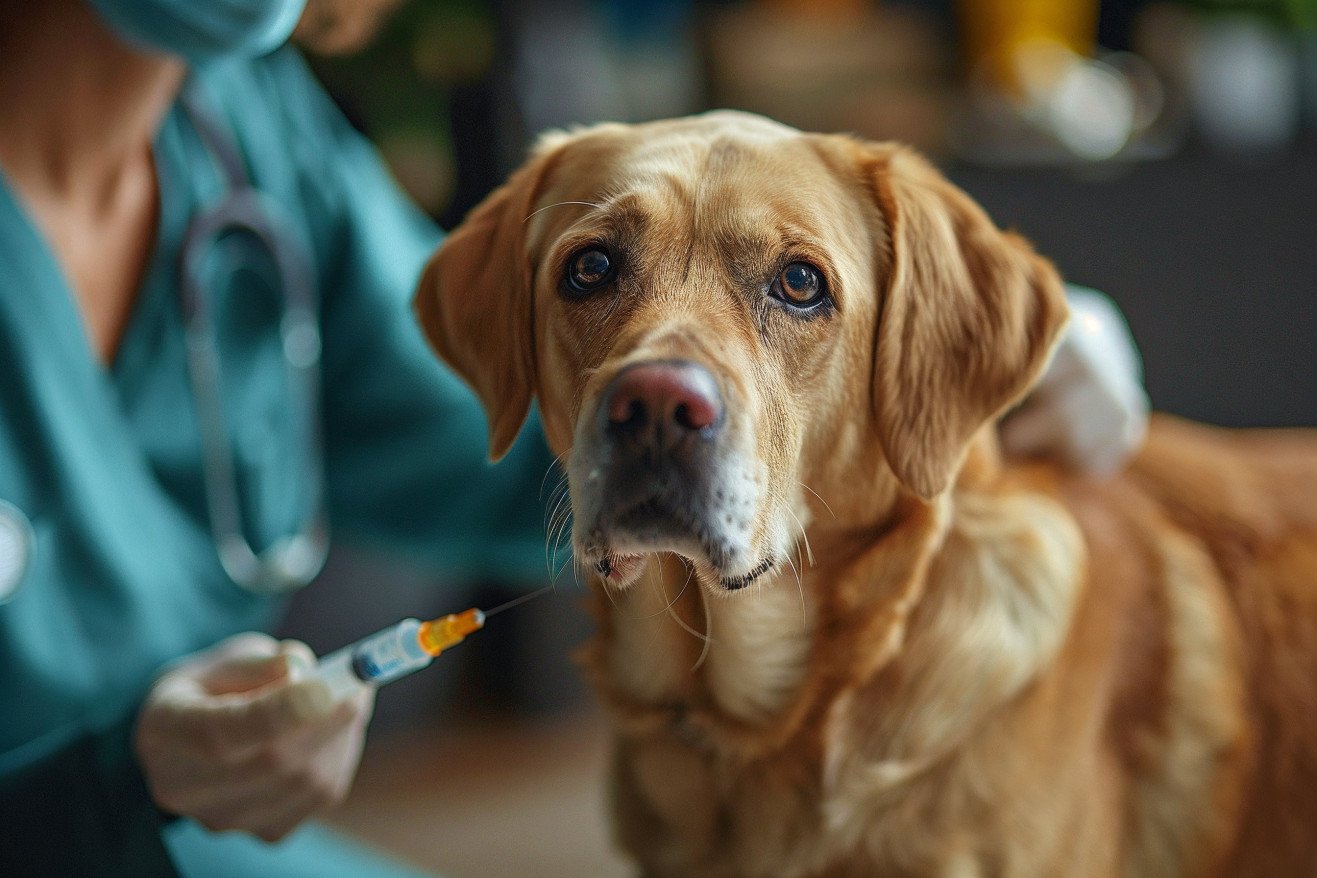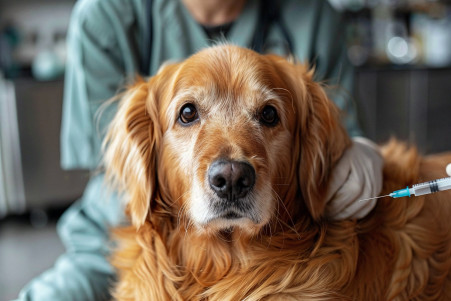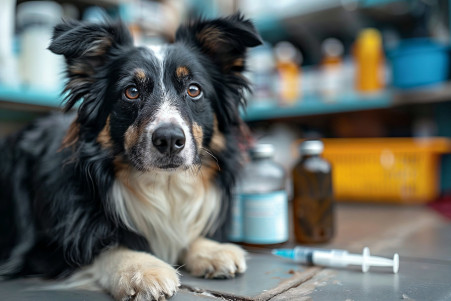DHPP Vaccine for Dogs: What It Protects Against
26 March 2024 • Updated 25 March 2024

Making sure your dog is up to date on their vaccines is important, but what exactly is the DHPP vaccine for dogs? The DHPP vaccine for dogs is a 4-in-1 combination shot that protects against distemper, parvovirus, parainfluenza, and two types of adenovirus (hepatitis). These are core vaccines recommended for all puppies and dogs and protect against a number of highly contagious and potentially fatal diseases.
In the sections below, we'll explore information from peer-reviewed journals in veterinary medicine and dog health organizations to learn about each disease component of the DHPP vaccine in depth. By understanding these diseases in detail, you'll learn why the DHPP vaccine is so important and when you should make sure your dog gets their vaccines to ensure they're protected at every stage of life.
What does the DHPP vaccine protect dogs against?
What the DHPP Vaccine Prevents
As noted by PetMD, distemper is a highly contagious and often fatal viral disease that can cause respiratory symptoms such as coughing, as well as neurological and gastrointestinal symptoms in dogs. Meanwhile, parvovirus is a highly contagious viral disease that causes vomiting, diarrhea, dehydration, and in the most serious cases, death - especially in puppies.
Parainfluenza is a respiratory virus that, according to Spring House Animal Hospital, results in coughing, nasal discharge, and difficulty breathing when dogs become infected. The DHPP vaccine also protects against canine adenovirus types 1 and 2. Type 1 is the cause of infectious hepatitis, which impacts the liver, kidneys, and other organs, while type 2 can cause respiratory diseases such as kennel cough.
All of these viral diseases are highly contagious and can have severe, potentially fatal consequences if left unvaccinated, particularly for puppies or dogs with compromised immune systems. Therefore, it's important to make sure your dog is vaccinated with the DHPP vaccine to prevent these life-threatening diseases and ensure your furry friend's well-being throughout their life.
DHPP Vaccine Schedule and Boosters for Puppies and Adult Dogs
Puppies will need a series of DHPP vaccinations, which usually start at 6-8 weeks of age and are given every 3-4 weeks until the puppy is 16 weeks old, per the Dyer Animal Clinic. After the initial puppy series, a booster is recommended at one year, with additional boosters for adult dogs every 1-3 years. If a dog's vaccination history is unknown, Pumpkin Care says that two DHPP vaccines should be given 2-4 weeks apart.
It is important to stick to the vaccination schedule to ensure that dogs are protected against these potentially life-threatening illnesses. Polo Springs notes that puppies that have been properly vaccinated will need boosters every 1-3 years based on the veterinarian's recommendation. This is important to make sure that dogs are protected against the serious viral diseases that the DHPP vaccine guards against.
Potential Side Effects and Risks of the DHPP Vaccine
As with all vaccines, the DHPP vaccine can cause minor side effects including redness, swelling, or tenderness at the injection site, lethargy, and a low-grade fever, per VCA Animal Hospitals. More severe side effects are rare but may include vomiting, diarrhea, difficulty breathing, hives, or allergic reactions, according to Progressive.
The DHPP vaccine is approximately 90% effective for 3-4 years, after which time dogs will need booster shots to keep their immunity up, according to Yahoo Sports. It's important to follow the aftercare instructions and watch for any side effects to make sure that your dog stays safe and healthy.
Why It's Important to Stick to the Puppy Vaccination Schedule and What Happens If You Miss a Booster
Puppies younger than 20 weeks are at high risk of contracting canine distemper and other viruses if they aren't vaccinated on time, according to The Zebra. If a dog misses a DHPP booster, they will be at risk of catching these viral infections, according to Van Isle Veterinary Hospital.
For dogs that are more than 3 years late on their core vaccine boosters, Today's Veterinary Practice says that a single dose is recommended, with regular boosters to follow. However, when it comes to leptospirosis vaccines, Vet Help Direct notes that the full 2-shot course may need to be restarted if the booster is more than a few months late.
It's important to stick to the recommended vaccination schedule to ensure that dogs are protected from the potentially deadly viral infections that the DHPP vaccine guards against. The best way to make sure that your dog is getting the vaccines they need on time is to talk to your vet.
Are There Legal Requirements or Age Restrictions for the DHPP Vaccine?
While the DHPP vaccine is not required by law in most places, it is recommended by veterinarians, according to Vista Veterinary Hospital. Puppies should not be given the DHPP vaccine until they are at least 6-8 weeks old because of the natural antibodies they get from their mother, according to Dogtopia.
If you have an adult dog that has never been vaccinated, they may need to be given two DHPP shots 2-4 weeks apart, according to Dogtopia. Some doggie daycares, boarding facilities, or dog parks may require dogs to be vaccinated against DHPP to enter, but this will depend on the specific facility.
It is important to talk to your vet to make sure that your dog is on the right vaccination schedule and is protected from these dangerous viruses throughout their life.
Keeping Your Dog Healthy with the DHPP Vaccine
The DHPP vaccine, also known as the 5-in-1 vaccine, protects dogs against five highly contagious viral diseases that cause severe illness and may be fatal: distemper, canine adenovirus-1 (CAV-1), canine adenovirus-2 (CAV-2), parainfluenza, and parvovirus, according to Daily Paws.
The vaccine is made from modified live viruses that don't cause illness but do stimulate the immune system to produce protective antibodies. Research has shown that the DHPP vaccine provides immunity for about 3 to 4 years, with a 90 percent level of protection, says Daily Paws.
The DHPP vaccination schedule for puppies includes an initial vaccine at 6 weeks old, followed by additional vaccines every 2 to 4 weeks until the puppy is 16 weeks old, according to Daily Paws. For dogs 16 weeks and older, the schedule is 1 or 2 doses, with a booster given 1 year after the initial series, then boosters every 3 years.
The cost of the DHPP vaccine can range from around $40 to $100, and pet insurance can help cover the expense, says Daily Paws. Some vet clinics offer wellness plans that cover the cost of vaccines.
According to VCA Animal Hospitals, some dogs may experience mild side effects like soreness or lethargy 1 to 2 days after being vaccinated. While rare, more serious side effects like an allergic reaction can occur, and if they do, you should contact a vet immediately.
Wrapping Up: Exploring the Protective Shield of the DHPP Vaccine
The DHPP vaccine is an important way to protect dogs from several potentially fatal viral diseases. It's important to follow the recommended puppy and adult vaccination schedules to ensure that your dog is properly immunized.
While side effects are usually mild, it's important to watch for any adverse reactions and follow your vet's instructions for aftercare. Talk to your vet to make sure that your dog is getting the DHPP vaccine and other necessary vaccinations to keep them as healthy and safe as possible.


